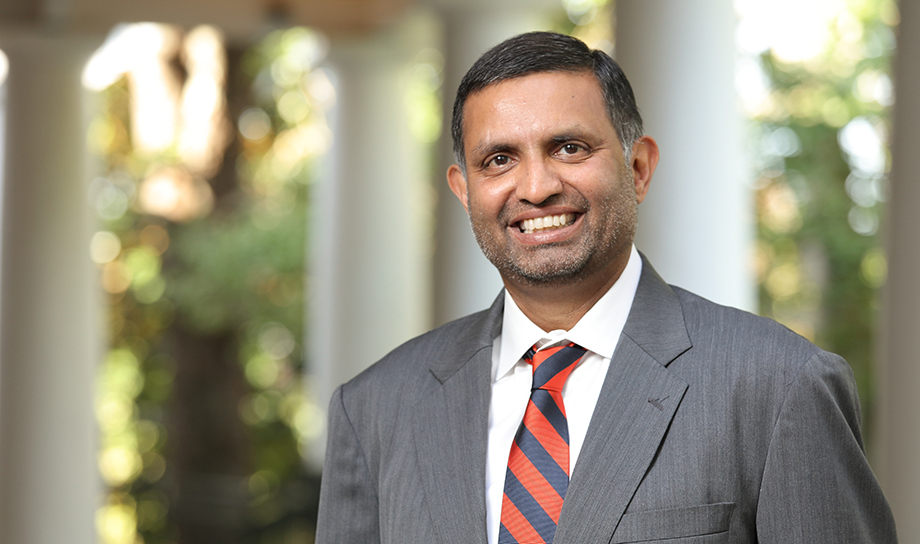Mike Young, a research scientist in Texas, could talk NCAA basketball zone defenses all day with his friend at the University of Virginia, professor Venkataraman “Venkat” Lakshmi — who, before social distancing, regularly played Thursday evening pick-up games with his students. When Young and Lakshmi aren’t ribbing each other about their university teams, they’re speaking another common language about the section of Earth between the land surface and the water table.
This section, called the vadose zone, anchors the systems of human life, Lakshmi said, supporting the buildings we live in, nurturing agriculture, filtering pollution and controlling floods. Lakshmi, a professor in the UVA Engineering Department of Engineering Systems and Environment, has spent considerable years seeking to understand the vadose zone. So has Young.

In recognition of Lakshmi’s work, Young nominated his friend and colleague for fellowship in the Geological Society of America, one of the world’s premier societies focused on earth sciences — an honor reserved for members of the society judged to be at the top of their profession. Lakshmi became a fellow this spring.
Young is a senior research scientist and associate director for environment division, Bureau of Economic Geology, Jackson School of Geosciences at the University of Texas at Austin. He tapped Lakshmi for fellowship for his “research into the key processes that control the physics of the land surface and the vadose zone, a vital area of the geological sciences that influences climate modeling, critical zone processes, surface runoff, etc., and his broad contributions to student training and science communication.”
Trained in civil and environmental engineering with degrees from Princeton University, the University of Iowa and the Indian Institute of Technology, Roorkee, Lakshmi arrived at UVA Engineering in 2019 after directing the National Science Foundation Hydrologic Sciences Program. He began his career at the NASA Goddard Space Flight Center, then held a number of appointments, including two one-year sabbaticals as Stanford University’s Cox Visiting Professor. From 1999 to 2018, he was on the faculty of the Department of Earth and Ocean Sciences at the University of South Carolina, serving as department chair from 2008 to 2011. Recently, he was appointed to serve on the Water Science and Technology Board of the National Academies of Sciences, Engineering and Medicine.
“Venkat is a leader who embraces the power of engineering and science to make the world a better place, and he has the enthusiasm and energy of three people,” said UVA Engineering Dean Craig H. Benson. “Through his many contributions to the civil and environmental engineering communities, he embodies excellence. We are thrilled he is a member of our faculty.”
Lakshmi specializes in using data collected from space, aircraft and in situ systems along with hydrological and ecological models to make observations about the terrestrial water cycle and to better understand weather, climate and ecology. He is one of several civil and systems engineering faculty members in the Department of Engineering Systems and Environment studying water resources using approaches that combine multiple disciplines of science and engineering. He is also part of a community of researchers at UVA Engineering and the UVA College of Arts & Sciences addressing environmental challenges, including the pan-University Environmental Resilience Institute.
Young said Lakshmi’s prolific mentorship of students in land surface modeling and satellite remote sensing — increasingly important focal points for the society — was a key reason for his nomination. Over his career, Lakshmi has advised dozens of graduates and undergraduates, including the seven UVA Ph.D. students working with him now.
Lakshmi’s leadership in the Geological Society of America dates back about a decade when he chaired the Southeastern Section’s annual meetings in Columbia, S.C. — around the time he first crossed paths with Young. The two also worked closely together on the Vadose Zone Journal, where Young was then the editor. Young was looking for an associate editor to volunteer to write what he calls common-language news releases for journal articles on topics they felt would be of interest to broader audiences. Lakshmi answered the call, Young said, proving adept at translating densely written scientific papers for everyday readers.
“He’s very skilled at this,” Young said. “He also writes lots of op eds. Venkat sees the importance of communicating to the general public, and takes an overt role in doing it.”
Today, Lakshmi co-edits the Vadose Zone Journal — one of his numerous editorial appointments, including as founding editor-in-chief of Remote Sensing in Earth Systems Science (Springer). His publications, presentations, professional service, honors and student awards add up to a 47-page curriculum vitae.
“This honor is another example of how Venkat is seen as a leader in his field,” said department chair Brian L. Smith. “The impact of his work for policy-makers, farmers and others fits so well with what we’re building in our department as a community of educators and researchers working to improve the large- and small-scale systems that people rely on to live better. That’s why we wanted him on our team.”
Lakshmi said he is honored by his selection as a Geological Society of America fellow.
“It's one of the largest geological societies in the United States and the world,” he said. “It’s good to be recognized and to represent the University of Virginia, the School of Engineering, and the Department of Engineering Systems and Environment.”